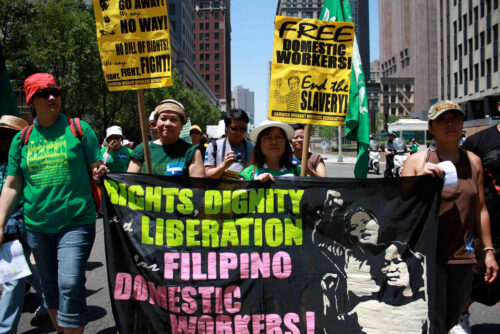Shackles of Fees and Debts
The guest worker regime in Asia exacerbates the commercialization of migration, which has dire consequences for migrant workers. In North America, where migrant workers are entitled to acquire permanent status, settled migrants act as contractors by recruiting relatives or acquaintances back home. Yet, in Asia the contract workforce is constantly replenished with new migrants, creating a situation where employers and workers alike lack sufficient information about the other party. They must therefore rely on private agencies as intermediaries.1 The agencies can thus appropriate a significant cut from the process of recruitment and placement.
Based on my investigation in Taiwan, a Filipina domestic worker usually pays 60,000 pesos, or around $1,300 USD, to her broker in the Philippines2 and the Taiwanese agent deducts “service fees” from her monthly wages (the fees add up to NT$60,000 (New Taiwan Dollars), or around $1,900 USD, for a contract of three years). The total amount equals to what she earns in half a year in Taiwan.3 Indonesian domestic workers are burdened with even higher financial costs. They have to pay monthly installments of NT$10,000, or around $300 USD, over a period of 14 to 16 months—the total equals 8 to 9.3 months of their salary. The charges, usually disguised as loan contracts, cover expenses for their stay in training centers and placement fees. Taiwanese agents usually give one-third of the payment or less to their Indonesian partners.
Migrants are usually told by recruiters that job offers in Taiwan are valid for two or three years. In fact, their contracts are renewed annually. Those who fail to extend their contract after one year rarely get their placement fees refunded. The financial burdens of debts and fees discourage migrant workers from asserting their rights. A group of migrant workers in Taiwan reported the following with respect to their fees: “Placement fees tie our arms from fighting.” “We still have five-six4 to pay at home!” “We are afraid if we speak out, we will be sent back to the Philippines. We don’t want to spend money on placement fees again. We would rather stay in Taiwan, at least making some money.”
Migrant workers, bound by financial shackles, exercise overt resistance only when a contract’s termination is inevitable. Open confrontation mostly happens toward the end of a contract or when employers attempt to terminate a contract. In Taiwan, migrant workers are also deprived of the opportunity to freely switch employers; as a result, some migrant workers manage to “run away” from their contractual employers. Ironically, the deprivation of freedom among documented migrant workers presents a striking contrast to undocumented migrant workers, who are “free” to switch jobs and gain increased bargaining power vis-á-vis unauthorized employers.5
- David Martin, “Labor Contractors: A Conceptual Overview,” Asian Pacific Migration Journal 5.2-3 (1996): 201-218; Yoshi Okunishi, “Labor Contracting in International Migration: The Japanese Case And Implications for Asia,” Asian and Pacific Migration Journal 5.2-3 (1996): 219-240. [↩]
- This amount will cover expenses for the preparation of a passport and other documents, as well as a medical checkup. According to the Philippine law, brokers are only allowed to charge one month’s salary as placement fee. The actually charged amount is usually more than that. [↩]
- In 2009, the minimum monthly wage for a migrant worker in Taiwan was NT$17,280, or around $540 USD. [↩]
- “Five-six” is a short-cut expression referring to loans borrowed from loan sharks in the Philippines: If one borrows 5,000 pesos, he or she has to return 6,000 pesos in a month (with a monthly interest rate equal to 20 percent). [↩]
- See Pei-Chia Lan, “Legal Servitude, Free Illegality: Migrant ‘Guest’ Workers in Taiwan,” in Rhacel Parreñas and Lok Siu, ed., Asian Diasporas: New Conceptions, New Frameworks (Stanford: Stanford University Press, 2007): 253-277. [↩]




